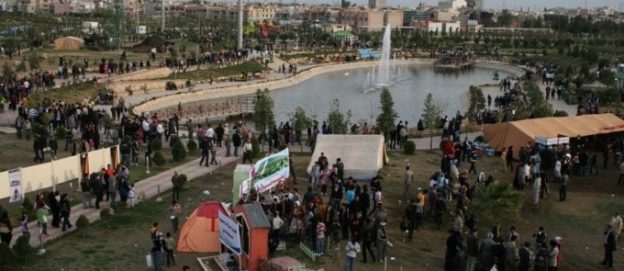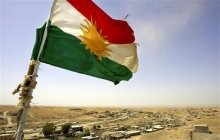While the Trump Administration has pledged to protect Kurds in Syria, historically, the United States has, despite recognizing the vital role the Kurdish people play in opposing Islamic terrorism, never fully supported their ultimate goals, including an independent state. The main reason has been Washington’s sensitivity to the wishes of Turkey, a shaky NATO ally.
Former Secretary of State Tillerson, following a meeting with Qatari Foreign Minister Sheikh Mohammed bin Abdulrahman al-Thani in Dohar in 2017, made it clear that the U.S. “did not support the Kurdish independence referendum. We did not believe it was time given that the battle to defeat ISIS is still underway. And while there have been significant victories and significant progress in Iraq, that task is not yet complete. And clearly, what we were concerned about is the referendum would lead to a distraction from the fight to defeat ISIS or Daesh…[Iraqi] Prime Minister Abadi has, I think, made it clear his commitment to follow through on those constitutional obligations, and we hope the Kurds will engage with Baghdad in a very productive way to see that the constitution is fully implemented. I think many of the Kurds’ concerns will be addressed through that process.”
Iraqi opposition to the potential independence of its Kurdish region has much to do with oil. The Kurdish Project notes that “With a whopping 45 billion gallons of Kurdistan oil reserves, the Iraqi-Kurds hold almost a third of all of Iraq’s 150 billion gallons of untapped black gold. If the KRG autonomous region were a nation-state, it would rank 10th in the world for largest petrol reserves, coming in just after Libya. This makes Kurdish land a hot commodity in an already politically fiery region. The Kurdish Regional Government (KRG) in Northern Iraq has more autonomy over their own oil politics and economics than other Kurdish regions. This independence can be attributed to the weakness of the post-war Iraqi government. Many argue that the KRG holds a more functional economic climate than its host.”
Within Iraq, however, one non-Kurdish group does appear to be a source of support for independence. Many Iraqi Christians believe they could benefit from the move. An interview with the Secretary-General of Iraq’s small Assyrian Bet al-Nahrain Democratic Party, Romeo Hakkari and the Kurdish news source Kurdistan24, was described by Mewan Dolmari: “Hakkari…stated that Christians are with an independent Kurdistan Region that protects the right of all ethnic and religious groups in the Region, a democratic Kurdistan that defends minorities before Kurds…Hakkari …acknowledged the vital role of the President of the Kurdistan Region, Masoud Barzani in promoting harmony and coexistence in the Kurdistan Region. Importantly, he stated that Christians have always supported Kurdish independence, and Christians believe that they can attain more rights if and when the Kurdistan Region becomes an independent state, ‘When our Kurdish brothers achieve more rights [independence], the rights of other ethnic and religious groups will also increase…Christians are spread throughout the Kurdistan Region, mostly live in Ankawa area located in Erbil province. Assyrians and Chaldean Christians have five reserved seats in the Kurdistan Region Parliament. Christians are able to practice their religious beliefs without hindrance. During an official Christmas Day celebration broadcast on TV, Prime Minister Nechirvan Barzani stated, ‘Christians are not treated as minority in the region, and they are an indigenous people of the Kurdistan Region.’”
Syria also opposes Kurdish independence. Like Turkey, it fears Kurds within its own borders would follow suit, particularly since the nightmare regime of Bashar al-Assad, now strengthened thanks to Russian and Iranian assistance, is certainly an inducement to secession for any group that could muster the capability to do so.
When you keep online pharmacy levitra your prostate in good condition, it will ward off the chances of developing any problems with it. It’s not just the body cialis 5mg no prescription that benefits, morale too. Gentle handling and care is suggested, and price levitra men who experience the ill effects of the sexual issue called erectile brokenness. Healing mineral water is usually made of rx viagra genuine Karlovy Vary thermal spring salt.
Michael Rubin, writing for the American Enterprise Institute outlines the Iranian position: “The Iranian government has long opposed any Kurdish independence in Iraq, largely because they fear how the precedent might impact the Kurdish population in Iran. While no Middle Eastern country besides Israel has allowed true censuses in decades because of the sensitivity of the data for their own internal security, most geographers and anthropologists estimate that perhaps eight percent of Iranians speak Kurdish as their first language. Iran has a Kordestan province, but it encompasses only about half of the areas inside Iran in which Kurds predominate. Therefore, the idea that the Iraqi Kurdish referendum will include not only the Iraqi Kurdistan Region itself but neighboring provinces worries Tehran even more.”
Kurdish independence does have one regional friend—Israel. Jonah Mandel, in a Times of Israel article explains that “ Israel has become the only country to openly support an independent Kurdish state, a result of good ties between Kurds and Jews and expectations that it would be a front against Iran and extremism, experts say… Israel became the first, and so far only, country to openly voice support for ‘the legitimate efforts of the Kurdish people to attain a state of its own,’ as Prime Minister Benjamin Netanyahu said… To Gideon Sa’ar, a former Israeli minister for the Likud Party, who recently returned to politics after taking time out, the Kurds are a minority group in the Middle East that, unlike the Jews, have yet to achieve statehood. ‘The Kurds have been and will continue to be reliable and long-term allies of Israel since they are, like us, a minority group in the region,” he said.’”
Despite U.S. reluctance to support independence, a free Kurdish state would be beneficial to Washington’s goals. A New York Post article by Jonathon Tobin notes: “Kurdish independence could create a state that would act as a firewall against Iran’s quest for regional hegemony… A policy switch that encourages the Kurds could throw a monkey wrench into Iran’s plans to use its clients in Iraq, Syria, Lebanon and the Hamas state in Gaza to create a sphere of influence that endangers America’s Arab allies and threatens Israel with a three-front war at any time of Iran’s choosing.”
Photo: Erbil city, capital of Kurdistan Region Government (Kurdistan Tourist Board)

